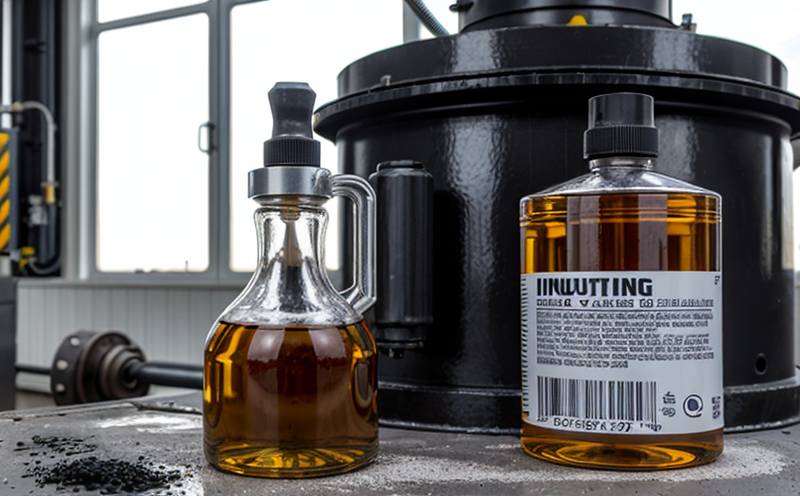ASTM D1298 Density Testing of Oils by Hydrometer
The ASTM D1298 standard specifies a method for determining the apparent density of petroleum oils, greases, and other non-homogeneous liquids using a hydrometer. This test is crucial for quality control in industries such as manufacturing, lubricant production, and chemical processing. The testing process involves measuring the displacement of a calibrated hydrometer in a known volume of liquid at a specified temperature.
The density of oil can significantly affect its performance characteristics, including viscosity, boiling point, and specific gravity. Understanding these properties is essential for ensuring that products meet quality standards and perform as intended under various conditions. This test provides critical data used during product development, manufacturing processes, and ongoing quality assurance checks.
Hydrometer testing is a relatively straightforward procedure but requires precision and accuracy to ensure reliable results. The testing process begins with preparing the sample by ensuring it is at the correct temperature for measurement. Samples must be clear or homogeneous; otherwise, they may not provide accurate readings due to variations in density throughout the liquid.
Once prepared, the hydrometer is lowered slowly into the sample until it floats freely. The point where the bottom of the stem just touches the surface is noted as the reading position. Multiple measurements are taken at different depths within the container to account for any stratification or temperature variations that could affect readings.
Understanding the importance of this test in various industries, we offer comprehensive ASTM D1298 density testing services tailored to meet your specific needs. Our experienced team uses state-of-the-art equipment and follows strict protocols to ensure accurate results every time.
| Key Parameters | Description |
|---|---|
| Sample Preparation | The sample must be at the correct temperature for measurement, free from air bubbles, and clear or homogeneous. |
| Hydrometer Selection | A suitable hydrometer should correspond to the expected density range of the liquid being tested. |
| Environmental Conditions | The test must be conducted under controlled environmental conditions, typically at 20°C (68°F). |
The results of ASTM D1298 density testing are used to ensure consistency in product quality and compliance with industry standards. These tests help identify any deviations from expected values that could indicate contamination or other issues requiring further investigation.
By incorporating ASTM D1298 into your quality assurance protocols, you can enhance the reliability of your products and maintain a competitive edge in the market. Our laboratory is equipped to perform these tests efficiently and accurately, ensuring that your samples meet all necessary specifications.
| Common Applications | Description |
|---|---|
| Lubricant Production | Evaluating the quality of lubricants to ensure proper viscosity and performance characteristics. |
| Petrochemical Processing | Monitoring the density changes during refining processes to optimize efficiency and product quality. |
| Manufacturing Industries | Determining raw material consistency for consistent end-product quality. |
The ASTM D1298 test is an essential tool for maintaining high standards in the production of industrial oils and lubricants. By providing accurate density measurements, this test ensures that products meet stringent industry standards and perform optimally under various operating conditions.
Scope and Methodology
The ASTM D1298 standard provides a comprehensive methodology for determining the apparent density of petroleum oils, greases, and other non-homogeneous liquids using a hydrometer. The test is conducted under controlled environmental conditions to ensure accuracy. Here’s an overview of the key steps involved:
- Prepare the sample at the correct temperature.
- Select an appropriate hydrometer for the expected density range.
- Fill a graduated cylinder with the sample and ensure it is level.
- Lower the hydrometer slowly into the liquid until it floats freely, noting the reading position.
- Repeat steps 2-4 multiple times to account for any stratification or temperature variations.
- Record all readings accurately.
The results of this test provide valuable insights into the physical properties of the sample being tested. These data are crucial for ensuring product quality and compliance with industry standards.
| Key Considerations | Description |
|---|---|
| Temperature Control | The test must be conducted at 20°C (68°F) to ensure accurate density readings. |
| Hydrometer Calibration | The hydrometer should be calibrated according to ASTM D1356 before use. |
| Sample Homogeneity | The sample must be homogeneous and free from air bubbles for accurate readings. |
Why Choose This Test
- Determines the apparent density of petroleum oils, greases, and other non-homogeneous liquids accurately.
- Ensures consistency in product quality across batches or production runs.
- Helps identify any deviations from expected values that may indicate contamination or other issues.
- Serves as a critical tool for maintaining high standards in the production of industrial oils and lubricants.
- Provides data useful for optimizing refining processes and improving overall product performance.
- Meets stringent industry standards, ensuring compliance with regulatory requirements.
The ASTM D1298 density test is an essential part of any quality assurance program. By choosing this service, you ensure that your products meet the highest quality standards and perform optimally under various operating conditions.
Environmental and Sustainability Contributions
ASTM D1298 density testing plays a vital role in promoting environmental sustainability by ensuring that industrial oils and additives are produced and used efficiently. Accurate density measurements help manufacturers optimize their processes, reducing waste and energy consumption.
The test also ensures product quality, which can lead to longer equipment life and reduced downtime, ultimately contributing to overall operational efficiency. By maintaining high standards in the production of industrial oils and lubricants, this service supports sustainable practices across industries.
Our laboratory adheres to strict environmental policies and uses eco-friendly practices wherever possible. We continuously seek ways to enhance our sustainability efforts while providing top-notch testing services.





